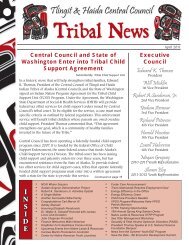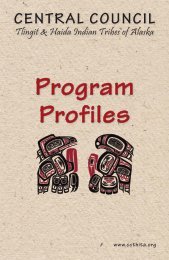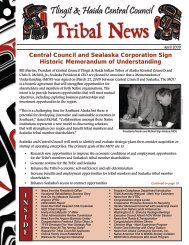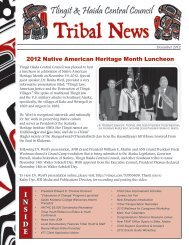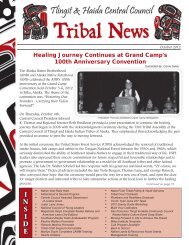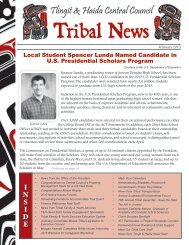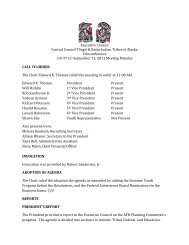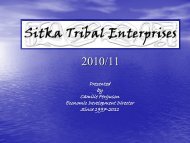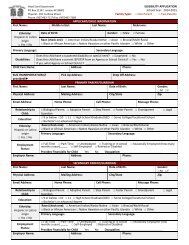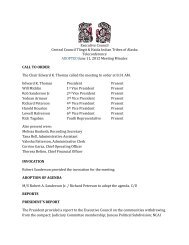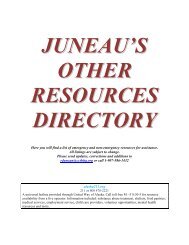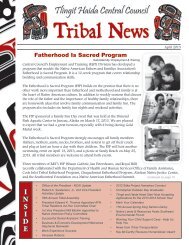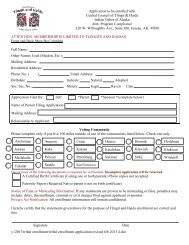June/July 2013 - Central Council Tlingit Haida Indian Tribes of Alaska
June/July 2013 - Central Council Tlingit Haida Indian Tribes of Alaska
June/July 2013 - Central Council Tlingit Haida Indian Tribes of Alaska
Create successful ePaper yourself
Turn your PDF publications into a flip-book with our unique Google optimized e-Paper software.
Cara Wallace<br />
(Cont. from cover)<br />
The Udall Foundation’s<br />
highly regarded internship<br />
program is intended to provide<br />
American <strong>Indian</strong>s and <strong>Alaska</strong><br />
Natives with an insider’s view<br />
<strong>of</strong> the federal government. The<br />
10-week internship is located<br />
in Washington, D.C., and is<br />
known for placing students<br />
in extremely competitive<br />
internship positions in Senate<br />
and House <strong>of</strong>fices, committees,<br />
Cabinet departments, and the<br />
White House, where they are<br />
able to observe government<br />
decision-making processes<br />
firsthand.<br />
To learn more about the Udall<br />
Foundation and its internship,<br />
please visit their site at www.<br />
udall.gov.<br />
22<br />
Supporting<br />
Families<br />
<strong>Central</strong> <strong>Council</strong> <strong>of</strong>fers family<br />
related services to support<br />
the individual needs <strong>of</strong> our<br />
tribal families. Child safety<br />
and well being are top<br />
priorities. Easy access<br />
to pr<strong>of</strong>essional,<br />
respectful<br />
services is our<br />
commitment.<br />
For more<br />
information,<br />
please contact<br />
Tribal Family<br />
& Youth<br />
Services<br />
in <strong>June</strong>au at<br />
907.463.7169<br />
or toll free at<br />
1.800.344.1432.<br />
Are Your Children and Grandchildren<br />
Enrolled Tribal Citizens<br />
Submitted By: Le Florendo<br />
Did you know that the <strong>Tlingit</strong> <strong>Haida</strong> <strong>Central</strong> <strong>Council</strong> has an open enrollment<br />
Our Program Compliance Office accepts membership applications on a daily<br />
basis. There is no quantum requirement, no residency requirement. Our<br />
Tribal Enrollment Committee meets during the year to review applications.<br />
Why is this important In our <strong>Indian</strong> Child Welfare Act (ICWA) Program,<br />
we are finding that more and more parents <strong>of</strong> children are not enrolled tribal<br />
citizens. Neither are the children.<br />
This means that we are having a hard time convincing most courts that an<br />
involuntary removal case falls under the protections <strong>of</strong> the ICWA (all state<br />
courts must apply ICWA to involuntary removal cases if we can show that the<br />
parent is an enrolled tribal citizen).<br />
Sometimes we can bully our way into court hearings, but if the <strong>Tlingit</strong> or<br />
<strong>Haida</strong> parent is not or chooses not to enroll, then the Court does not apply the<br />
protections <strong>of</strong> ICWA.<br />
The minimum federal standards that apply across the country are:<br />
Parents are entitled to an attorney if they cannot afford one. A mother and<br />
father should have separate attorneys because their interests in the child/ren<br />
may go in opposite directions during the course <strong>of</strong> a case.<br />
Placement preferences for <strong>Indian</strong> children are 1st order: with a member <strong>of</strong> the<br />
child’s extended family; 2nd order: a member <strong>of</strong> the child’s tribe; 3rd order: a<br />
member <strong>of</strong> another tribe. If a child’s plan is adoption, we look for a member<br />
<strong>of</strong> the child’s family to serve as a permanent placement. We try to do this at<br />
the beginning <strong>of</strong> the case, rather than at the Termination <strong>of</strong> Parental Rights<br />
phase <strong>of</strong> a case.<br />
ICWA does not apply to custody disputes between parents <strong>of</strong> a <strong>Tlingit</strong> or<br />
<strong>Haida</strong> child. If a parent in the dispute is non-Native, that parent meets the<br />
ICWA definition <strong>of</strong> “parent.” The ICWA definition does not distinguish<br />
between Native and non-Native.<br />
Bringing it back to enrollment applications, if the Native parent <strong>of</strong> the child is<br />
the father, his name must be on the child’s birth certificate – or the applicant<br />
should attach the paperwork showing the results <strong>of</strong> DNA testing verifying his<br />
relationship to the child. Enrollment applications are available on the <strong>Central</strong><br />
<strong>Council</strong> website.<br />
Again, under ICWA, a parent <strong>of</strong> the child must be a card-carrying tribal<br />
citizen. As we go through life, tribal citizenship can be very important, both<br />
spiritually and concretely – when you know who you are and where you<br />
come from. Our ICWA Program tries to connect children to their parents’ or<br />
grandparents’ villages or communities. You would be surprised to know how<br />
many people are excited about where they come from.



